Upskirting made criminal offencepublished at 17:41 GMT 12 February 2019
Offenders will face being jailed for two years and being put on the sex offenders' register.
Read MoreMPs vote to reject a government motion on Brexit
Some Brexiteers were unhappy with it, saying it implies support for ruling out a no-deal Brexit
Amendments put forward by Labour and the SNP were also rejected
Tory MP Anna Soubry decided not to push her amendment to a vote
It would have called on ministers to publish certain no-deal briefing papers
Sophie Morris and Richard Morris
Offenders will face being jailed for two years and being put on the sex offenders' register.
Read MoreMental Capacity (Amendment) Bill
 House of Commons
House of Commons
Parliament
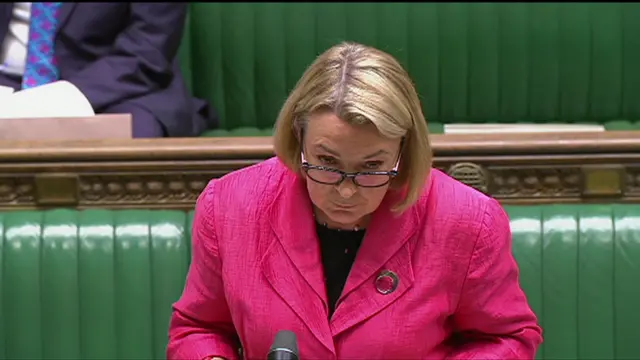 Image source, HoC
Image source, HoCShadow mental health and social care minister Barbara Keeley says the government was forced to make concessions in the Lords, but as it offers far too much power to care home managers, Labour will not be supporting the bill this evening.
Ms Keeley says it is clear that care home managers themselves do not want this power given to them, and suggests the reason the government is pursuing this policy is for "cost-saving purposes".
There is a serious resource issue in local councils, she adds, noting that Labour's amendment ensures that cash-strapped local councils are not able to delegate their responsibility over an individual's care.
There should be an "absolute right" for people to request an advocate to act in the best interests of those in care, she says. "There are countless examples of how important an advocate can be," she adds.
She warns that there "are loopholes" in the current situation.
The PM promises a final vote on her deal after talks with the EU - Labour says she is running down the clock.
Read MoreMental Capacity (Amendment) Bill
 House of Commons
House of Commons
Parliament
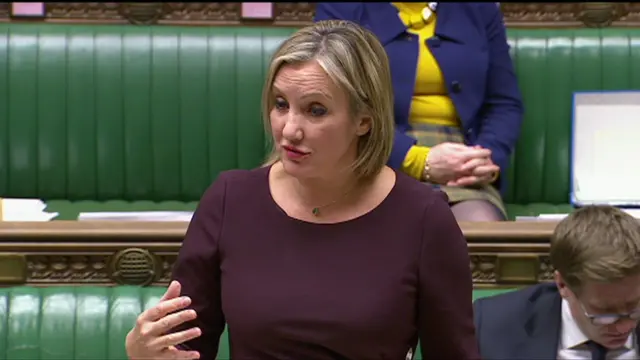 Image source, HoC
Image source, HoCHealth Minister Caroline Dinenage says she understand Mr Bryant's point on neurorehabilitation, and provides reassurance that a deprivation of liberty should only occur where it is "essential".
She adds that the government have considered "very carefully" how the model will work for those acquired brain injury and consideration of deprivation arrangements will work alongside neurorehabilitation therapy.
Mental Capacity (Amendment) Bill
 House of Commons
House of Commons
Parliament
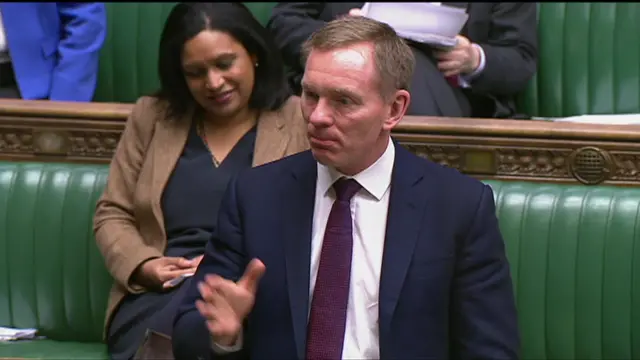 Image source, HoC
Image source, HoCLabour's Chris Bryant introduces his amendments to the Mental Capacity (Amendment) Bill.
The MP says that the law needs to manage families with care and adds that decisions around mental capacity can be difficult.
Mr Bryant's amendments are in to regard to acquired brain injury and he refers to it as a "hidden epidemic".
Around 1.4million people are living with an acquired brain injury in the UK, he tells MPs.
Mr Bryant gives examples of the causes, including stroke or accidents or carbon monoxide.
A number of MPs intervene on Mr Bryant to raise injuries arising from sport and military service.
Chris Bryant says that neurorehabilitation can increase functionality and independence, and denying liberty may no longer be appropriate after treatment.
His amendment seeks to legally address the issue.
Mental Capacity (Amendment) Bill
Allow X content?
This article contains content provided by X. We ask for your permission before anything is loaded, as they may be using cookies and other technologies. You may want to read X’s cookie policy, external and privacy policy, external before accepting. To view this content choose ‘accept and continue’.
Mental Capacity (Amendment) Bill
 House of Commons
House of Commons
Parliament
MPs are debating the main business of the day, the Mental Capacity (Amendment) Bill.
The bill has passed all the legislative stage of the House of Lords and is on report stage.
This bill reforms the Mental Capacity Act 2005, relating to the authorisation to detain people who don't have the ability to consent, so that they can receive care or treatment.
The bill extends and applies to England and Wales only.
Ten Minute Rule Bill
 House of Commons
House of Commons
Parliament
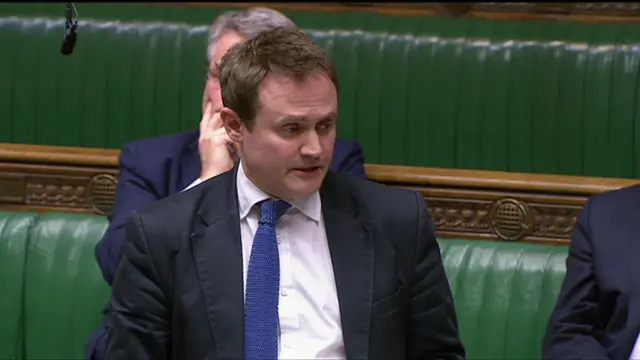 Image source, HoC
Image source, HoCTom Tugendhat says the purpose of the bill is to "ensure" those convicted of the crime face "appropriate punishment".
The bill calls on the maximum sentence to be raised from ten years to life.
He pays tribute to the inspiration for 'Tony's' bill.
Tom Tugendhat says Tony Hudgell was attacked by his parent's and both his legs were amputated. He was only admitted to hospital 10 days after the incident.
He concludes that he introduces the bill for innocent children who are at risk of the "most awful of crimes".
 House of Commons
House of Commons
Parliament
Conservative MP Tom Tugendhat is proposing a bill which would see those convicted of child cruelty given a life sentence.
The bill prompted by the case of his constituent Tony Hudgell, now four years old.
He was beaten so badly by his birth parents (Hudgell is the name of the parents who later adopted him) that he had to have both legs amputated.
Mr Tugendhat wants judges to have the option of passing longer sentences than the current ten year maximum, in these very rare cases.
Point of Order
 House of Commons
House of Commons
Parliament
Shadow transport secretary Andy MacDonald says the transport secretary has misled the House.
He says that in answer to an urgent question Chris Grayling said no taxpayers' money had been spent on the Seaborne Ferry contract but the National Audit Office found that £800,000 had been spent on external consultants.
Deputy Speaker Rosie Winterton replies that if the transport secretary believes he has misled the House he will correct the record.
 House of Commons
House of Commons
Parliament
Conservative MP Robert Halfon tells MPs about his area, and how local people have seen the closure of three local papers.
He says older people have even rang his office for news.
You can read more about the story here:
Last local paper shuts so elderly ring MP for news - BBC News
Cairncross Review Statement
 House of Commons
House of Commons
Parliament
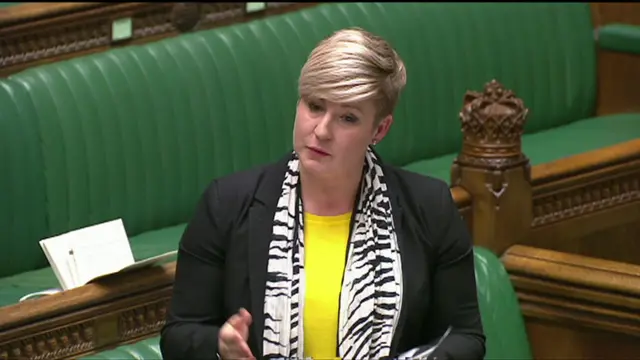 Image source, HoC
Image source, HoCHannah Bardell, SNP culture spokesperson, says her party welcomes the Cairncross Review.
Ms Bardell says the report comes after scandals around Vote leave and Cambridge Analytica.
"To persuade online platforms to act in a more responsible way is hugely important," she adds.
She encourages the culture secretary to adopt as many of the review's recommendations as possible.
The spokesperson says there is a "huge issue" around the license fee and accuses the secretary of state's predecessors of holding the BBC "to ransom".
She calls for criminal sanctions for tech companies and asks what measures will be necessary to bring tech companies on board.
Culture Secretary Jeremy Wright replies "we should be insistent" on the platforms taking responsibility to ensure misinformation and disinformation are addressed.
He adds an independent regulator is something the government is considering.
The Bank of England governor urges MPs to solve the Brexit impasse amid warnings of slowing global growth.
Read MoreCairncross Review Statement
 House of Commons
House of Commons
Parliament
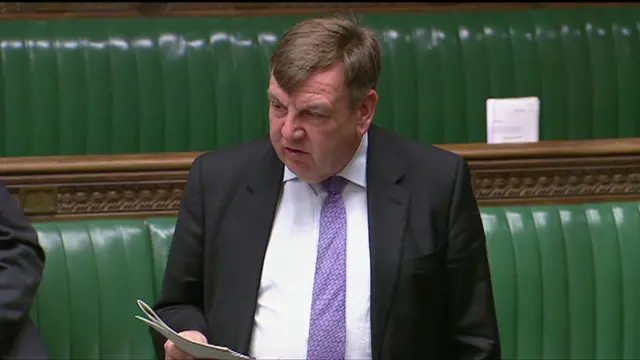 Image source, HoC
Image source, HoCConservative MP John Whittingdale says the report acknowledges "one of the greatest challenges to a properly functioning democracy today".
He asks if the priority should be to facilitate more professional journalists to report on local institutions.
Jeremy Wright agrees and says a large part of the answer is to provide the scrutiny that is necessary. He says the BBC local democracy reporters scheme has room for further expansion.
Cairncross Review statement
 House of Commons
House of Commons
Parliament
Jeremy Wright says he is pleased to think MPs can work together on the issue.
With regard to the BBC, he says it's appropriate to ask Ofcom to assess BBC marketplace share.
And he says that when it comes to Google and Facebook, it is right to involve the Competition and Markets Authority, and he says he believes it is right to begin a government-centred review.
"It is fundamental to our democracy and our society that we can trust what we read," he says, and the review offers some ways forward to ensure that happens.
Cairncross Review Statement
 House of Commons
House of Commons
Parliament
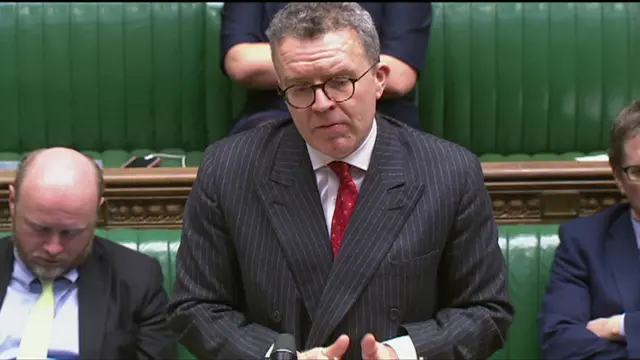 Image source, HOC
Image source, HOCShadow culture secretary Tom Watson says the review is "a small milestone" to address digital publishing and that the right solution requires creative solutions and cross-party co-operation.
Mr Watson says newspaper circulation rates have fallen by half, 350 local news titles have closed, and half of Britons are worried about fake news.
He adds that emerging tech companies are extracting value from others content and take "little responsibility for the destruction they leave in their wake."
The BBC provides public interest and publicly trusted content, says the Labour MP.
He asks if the secretary of state will commit to not pick a fight with the BBC and tackle the real problem of a "distorted digital market".
He says the UK needs to address the market abuse caused by data monopolies and calls for a duty of care to placed on social media companies, enforced by a regulator.
He asks if Mr Wright is considering criminal sanction rather than civil penalties.
Tom Watson concludes by calling for a "spirit of unity" to deal with the "destructive dominance of tech giants".
Analysis
Amol Rajan
Media editor
Frances Cairncross earned widespread respect as a journalist for her hard-headed and pragmatic approach to economics.
That pragmatism is the very reason the government commissioned her to look at the future of high-quality news - and also the reason many in local and regional media will be disappointed by her recommendations.
What is most notable about her review is what it doesn't do.
This is because the practicalities of doing these things are difficult, and experience shows that the likes of Google will simply pull out of markets that don't suit them.
There are concrete measures that could boost local news, from tax relief to an extension of the Local Democracy Reporting Service.
And Dame Frances certainly seemed cognisant of the argument that BBC News has over-reached, to the extent that it is harming the commercial sector. But this is a matter for Ofcom.
Ultimately, as this report acknowledges, when it comes to news, convenience is king. The speed, versatility and zero cost of so much news now means that, even if it is of poor quality, a generation of consumers has fallen out of the habit of paying for news.
But quality costs. If quality news has a future, consumers will have to pay. That's the main lesson of this report.
Cairncross review statement
 House of Commons
House of Commons
Parliament
There are areas where the government plans to consult further, the secretary of state says. Those include the establishment of a fund for public interest news to promote local and investigative news.
He points to the local democracy reporters, and discusses extending the BBC'sLocal Democracy Reporting Service, which reports on council decisions.
He says the decision about VAT exemption for digital news products will be kept under review.
He says increased media literacy is another recommendation the government will be looking at.
Cairncross Review Statement
 House of Commons
House of Commons
Parliament
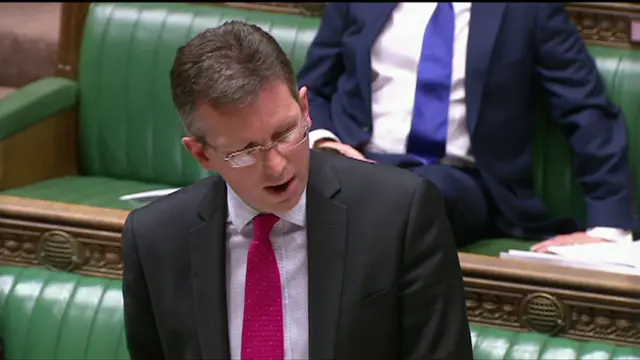 Image source, Hoc
Image source, HocCulture Secretary Jeremy Wright says the review comes at "an important time" and says the report paints a "vivid picture".
He says there are 6,000 fewer journalists than a decade ago.
Mr Wright says the "main driver" is a change on how we consume content online and publishers have struggled to create sustainable business model.
Mr Wright agrees that public interest journalism is "essential to our democracy" and it is under threat at a local level.
The report asks if the BBC's free to access content makes it harder for other publications and if it is straying too far into softer news content.
The secretary of state says the government recognises the "strong and central" role but will ask Ofcom to assess the report's recommendations on the BBC.
It is suggested that BBC news could drive more traffic to commercial sites.
Cairncross Review Statement
 House of Commons
House of Commons
Parliament
Culture Secretary Jeremy Wright is beginning his statement on the Cairncross Reviewinto the future of UK journalism.